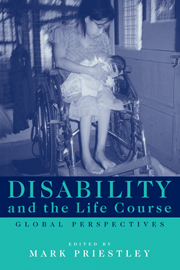Book contents
- Frontmatter
- Contents
- List of figures
- List of tables
- Notes on contributors
- Preface
- Acknowledgements
- A brief note on terminology
- I Concepts
- 1 Introduction: the global context of disability
- 2 Repositioning disability and the life course: a social claiming perspective
- 3 Marginalisation and disability: experiences from the Third World
- 4 Where do we draw the line?: surviving eugenics in a technological world
- 5 A complicated struggle: disability, survival and social change in the majority world
- II Methods and stories
- III The politics of transition
- Index
2 - Repositioning disability and the life course: a social claiming perspective
Published online by Cambridge University Press: 30 September 2009
- Frontmatter
- Contents
- List of figures
- List of tables
- Notes on contributors
- Preface
- Acknowledgements
- A brief note on terminology
- I Concepts
- 1 Introduction: the global context of disability
- 2 Repositioning disability and the life course: a social claiming perspective
- 3 Marginalisation and disability: experiences from the Third World
- 4 Where do we draw the line?: surviving eugenics in a technological world
- 5 A complicated struggle: disability, survival and social change in the majority world
- II Methods and stories
- III The politics of transition
- Index
Summary
A life course orientation sensitises us to various issues and processes and puts these at the heart of analyses of social change. As well as the importance placed on individual trajectories through different life course stages, and on the dynamics and historical aspects of people's lifetimes, a life course perspective can facilitate exploration of change in general social arrangements. This chapter is organised around three sets of issues concerning life course and general social arrangements which all raise interesting questions in respect of theorising aspects of disability.
In the first part of the chapter I will outline what is conventionally thought of as a life course perspective, with its emphasis on the dynamics of individual lifetimes and their articulation with social structures and historical context. There are a range of insights to be gained from exploring the experience of disability from a life course perspective as well as associated insights into the structuring of ‘standard’ social arrangements which can remain hidden from view and taken as given in non-disabled perspectives.
In the second part of the chapter I shall consider conceptualisations of the modern life course as a tripartite structure shaped in large part through the organisation of work, education and welfare in modern society, and through relations of dependence and independence, issues that are also core to conceptualisations of disability.
- Type
- Chapter
- Information
- Disability and the Life CourseGlobal Perspectives, pp. 15 - 25Publisher: Cambridge University PressPrint publication year: 2001
- 8
- Cited by

